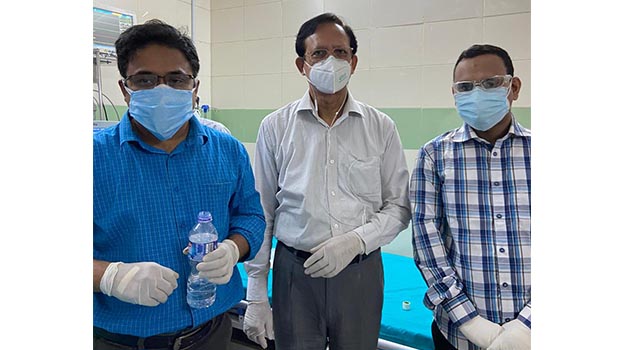2 doctors become first plasma donors in Bangladesh study

Two doctors who survived from coronavirus have become the first donors of blood for the plasma therapy study in Bangladesh.
Prof MA Khan, who is coordinating the country’s first such trial as the president of the technical sub-committee of plasma therapy, told Bangladesh Post that they had collected blood from the two doctors on Saturday at the Dhaka Medical College Hospital, the study site.
The donors - Dr Dildar Hossain of Suhrawardhy Medical College Hospital and Dr Rawnaq Jamil of the Mitford Hospital – are ‘happy’ to be part of the study.
“We are thankful that our doctors are coming up for donations after getting well from the virus and also the members of the police forces showed interest, but we want the participation of general people.
We’ll get our professionals anytime. If we get general donors, then we can keep our professionals as backup,” Prof Khan said. “There is no risk of donation after recovering from the virus. It’s safe.
There is no chance of infection,” he said to encourage survivors to come forward to help them for the study titled ‘randomised clinical trial’ in which 45 patients would get plasma.
They would be followed against the similar number of patients without giving plasma which is the liquid portion of blood that remains when all red and white blood cells and platelets have been removed.
It was over a hundred years ago that Emil Behring was awarded the first Nobel prize for physiology and medicine for his work demonstrating that plasma could be used to treat patients suffering from diphtheria.
It is being seen as a ‘stopgap measure’ globally as none of the many options being explored from using new drugs to existing drugs and vaccine development has been fast enough to keep up with the pace of the coronavirus spread.
After someone is infected with a virus like the novel coronavirus and recovers, their blood is rich with antibodies that their immune system produced to help them fight the virus off.
Giving the antibody-infused blood plasma to a newly sick person, who may not have antibodies yet, doctors hope that could help them fight the virus and recover more quickly.
Studies during the 1918 flu pandemic showed that such plasma infusion therapy was an effective treatment.
This convalescent plasma has been trialled as a therapy in previous coronavirus outbreaks and was also tested during the Ebola virus outbreak in 2013-2016.
During this pandemic, there are several studies conducted in China where the virus first emerged in December last year showed that the plasma therapy is safe and improves patient outcome.
Prof Khan, who was the key person of Bangladesh’s first bone-marrow transplantation at the DMCH, is also optimistic.
He said they would start reinfusing plasma into the sick patients once they completed the process.
“We are storing the blood at the Department of the Blood Transfusion who will separate all the cells to collect plasma and store it for antibody testing.
The antibody kits have already arrived from Spain. But we’ll test antibody after collecting plasma from 10/12 persons to reduce costs,” Prof Khan, who is also co-opted as a member of the 17-member National Technical Advisory Committee on Covid-19 in Bangladesh, said.
To complete the study, he sought Tk4 million from the government for buying kits for plasma collection and antibody testing.
“This is the right time to do so (plasma therapy) since we have no drugs, no vaccines. When we’ll have drugs, then plasma therapy will not be required,” he said.
The number of people becoming sick and dying due to pandemic continues to rise in Bangladesh. The government till Saturday confirmed 20,995 cases and 314 deaths since the first detection of the outbreak in Bangladesh on March 8.
“We need to start it (plasma therapy) now. We cannot wait. If we can save a few lives, that will be huge contribution,” he said, adding that to get better outcome, plasma needs to be infused at the early stage of an infected patient.
“In China they found even patients on ventilators also recovered,” he said.




